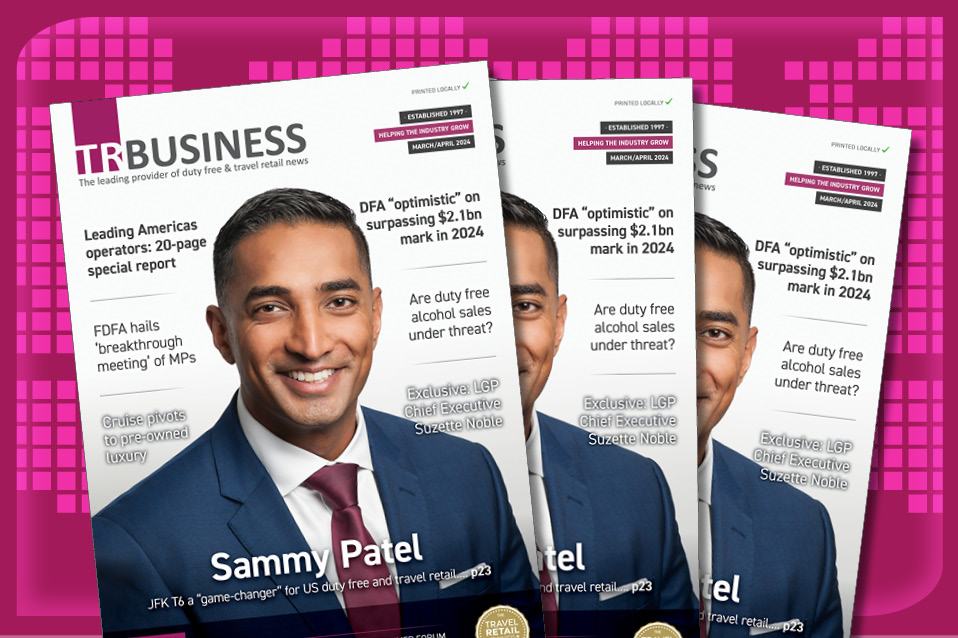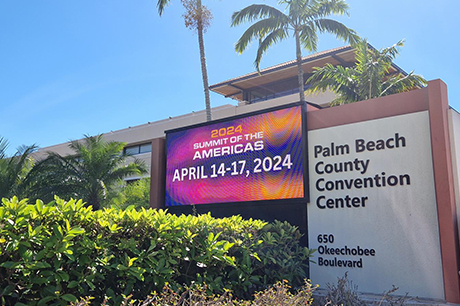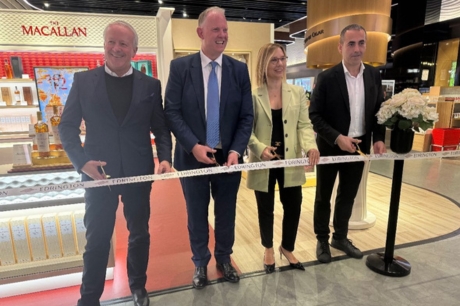Prof. Erin Meyer decodes how cultural differences impact intl. business

[UPDATED] Erin Meyer, Professor and Author at INSEAD, was the first guest speaker to take to the stage at the TFWA World Conference this morning (Monday 2 October), following an enlightening opening address by TFWA’s President Erik Juul-Mortensen.
Meyer, author of the ground-breaking book The Culture Map: Breaking Through the Invisible Boundaries of Global Business, drew upon her work decoding how cultural differences impact international business to provide delegates with fresh ways of looking at how global businesses are managed.
She took those in the room on a deep dive into two key communication dimensions, covering the communication styles ‘low context’ versus ‘high context’ cultures, and how different cultures process negative feedback.
Her valuable, and often humorous insights, offered a great introduction into ways to better understand the communications styles of different cultures and pave the way for bringing more diversity into conversations.
For ‘low context’ cultures such as the US, UK, Australia, Canada and Ireland, explicit, simple and clear messaging is order of the day.
Conversely, for ‘high context’ cultures such as Japan, Malaysia, Thailand, Emirati and Nigeria, implicit, layered, nuanced is key as is reading between the lines of conversations – or “reading the air” of the room, as Meyer describes
“So what happens when you have people trying to collaborate up and down the scale?” she posited.
“In low context cultures we tend to nail things down in writing more frequently than in high context cultures where we leave things more open to interpretation,” she said.
“When we are collaborating, we have perceptions of what’s going on. When low context people work with high context people, they complain say they are lacking transparency.
“High context people often complain that low context people come across as condescending.”

Meyer in conversation with Conference moderator Bob Woodward.
She gave an example of an Emirati who believed that talking on the phone and agreeing points verbally was sufficient, but when sent a written recap from an American colleague, it was taken as a sign of a lack of trust.
To put it in some further context, the US is the lowest content culture in the world and Japan is the highest.
“We can then see that the most misunderstandings do not happen when one low context culture works with another or a low context with a high context. We see the most misunderstandings in a global collaboration between two high context cultures that don’t share similar roots, such as Spanish with Indonesians. We are all reading between the lines and all ‘reading the air’ – but we have different air,” she said.
“High context communication is great when we are all from the same culture, but the more international we are, the more we have to simplify our communication and put it in a low context way.”

Meyer took questions from the audience.
Conclusions drawn included how multi-cultural teams need low context processes to optimise efficiency.
In addition, with low context people, the aim should be to be as explicit as possible in communication by, for example, putting it all in writing and repeating key points.
Finally, with high context people, Meyer underscored the need to ask clarifying questions, to repeat points you make and work on increasing your ability to ‘read the air’ (look for non-verbal signals that could help to maximise the interaction).
Meyer also gave a brief insight into a new thread of research looking at the comfort levels around silence across difference cultures.
Interestingly, Japan, Thailand, China, Korea, Myamar and Malaysia has the highest comfort with silence whereas India, as well as the US, Brazil and Uruguay has the lowest comfort levels.
Her expert insights provided great input for more effective meetings during the busy week ahead and beyond.
From scarcity to abundance
Author, economist and entrepreneur Dr Pippa Malmgren was the penultimate speaker of the TFWA Conference.
She opened her address with an acknowledgement that everyone she spoke to mentioned they are working at maximum levels, with such productivity expected to yield an uplift in performances across the globe’s economies.
People are interested in luxury goods and brands, but also a greener future, she described.
In an animated address, Malmgren tackled several big picture topics head on.
“How are we going to deal with a world where geopolitics and dreadful headlines dominate the landscape?” She questioned. “The answer? Creativity. You think you’re in the business of sales… You’re not. You’re in the business of art; creating a feeling.”
Quoting US writer Mark Twain, Malmgren said ‘you can’t depend on your eyes when your imagination is out of focus’.
She referenced the latest attempts to voyage to the moon, questioning whether it is an example of ‘billionaires joyriding’ at huge financial costs, or an attempt at securing what would be a tranformatory shift towards clean, green energy from space.
Malmgren said nuclear fusion is another example where people are working towards cleaner, greener energy.
“Imagine for a moment after a lifetime of thinking about scarcity, hydrobacarbons, ripping earth up to get all the resources we need… we are on the brink of clean, green infinite possibilities.”
“If you’ve spent your whole life thinking about scarcity, now might be a good time to think about abundance, real abundance of energy, resources, connectivity, as someone you are interviewing as greater than themselves, a gift to be brought out.”
Touching on asteroid mining and building the first interplanetary internet, with governments investing significant resources in super computing and quantum computing, Malmgren then addressed artificial intelligence.

Dr Pippa Malmgren worked in the White House as a political and trade advisor and more recently founded a number of start-ups in fields such as robotics and AI.
“Yes, AI will be an amazing tool, it removes the need for coders; regular people will be able to build websites, business, cashflows without paying Silicon Valley hundreds of thousands of dollars. This will unleash creativity.
“But it has some negative side affects. It tends to remove the outliers [of human experience] and focuses on the norm. When you use AI it’s like a sheepdog that is constantly corralling us into narrower intellectual pens.”
She went on the elaborate that while AI offers populations more of what we want; you have to fight the algorithms, else we’ll end up with world that is ‘very beige’.
On the metaverse, Malmgren described it as a way of storytelling, mentioning how VR headsets are being put on cattle to produce more and higher quality meat and milk.
“Do not underestimate the power of this kind of visual storytelling,” she urged.
Malmgren’s attention then turned to geopolitics.
Contrary to the historic ‘hot wars’ in ‘cold places’ theory, we’re now in a ‘cold war in hot places,’ particularly in Africa and the Pacific, she said.
We are in a world where nuclear war is being threatened, she went on to warn. However, she qualified that remark by mentioning how historically nuclear threats have dissipated.
“They end in a hug,” she said, referencing examples such as her work with Ronald Reagan in negotiating with Gorbachev in the Cold War era.
Conflict turns to peace incredibly quickly, she said, referencing the end of the Soviet Union.
As a two-time Pulitzer Prize-winning journalist, Associate Editor of the Washington and one of the most acclaimed journalists of his generation, Bob Woodward then took to the stage as the TFWA Conference reached its finale.
From his role covering the Watergate scandal (alongside fellow journalist and author Carl Bernstein) to his recent books covering the Trump presidency, Woodward offered a unique perspective on US and global politics.

A fascinating exchange took place between TFWA Conference Moderator Stephen Sackur (left) and award-winning US journalist Bob Woodward.
In a fascinating exchange with Stephen Sackur, TFWA Conference moderator and broadcaster, journalist and the presenter of the long-running BBC World current affairs programme HARDTalk, Bob Woodward discussed the ‘politics of hate’ that has characterised Donald J. Trump’s campaign for the US presidency.
Ask whether he was scared at the current condition of the US, he responded: ‘Yes, it’s frightening’.
Rather than the US being dragged down by so-called ‘Trumpism’, Woodward said the US has the ability to take away the threat of Trump.
He went on to recall conversations around Covid and the early threats and warnings given early to Trump, drawing corollaries with the press’s ‘enemy of the people’ tag associated with the Nixon administration.
On his own remarkable talents, Woodward was asked by Sackur about the best way to get sources ‘to spill their guts’.
Woodward said listening remains a powerful tool in the quest for facts.
“You need the silence to suck out the truth,” he said, emphasising the need to take interviewees with big egos as seriously as they take themselves.
TR Consumer Forum: Agenda & speakers revealed
Influential speakers will unpack the most effective strategies for understanding and engaging...
OUT NOW: March/April Leading Americas Operators
The TRBusiness March/April 2024 edition boasting the inimitable leading Americas Operators...
IAADFS evolves; Americas summit to move to Miami
The International Association of Airport and Duty Free Stores (IAADFS) has adopted a new...
-
 International,
International,TR Consumer Forum: Agenda & speakers revealed
-
 International,
International,OUT NOW: March/April Leading Americas Operators
-
 International,
International,IAADFS evolves; Americas summit to move to Miami

In the Magazine
TRBusiness Magazine is free to access. Read the latest issue now.

 Trbusiness. The travel retail Trbusiness. The magazine for global retail and duty free professionals.
Trbusiness. The travel retail Trbusiness. The magazine for global retail and duty free professionals.





















